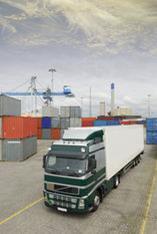
Government proposals to charge lorries for using the UK's roads have been welcomed for potentially offering a fairer deal for British road freight operators, providing they do not add an administrative burden to the industry.
The Freight Transport Association (FTA) has long been calling for foreign lorries to pay their way on the UK's road network because it argues they put British companies at a disadvantage.
The FTA's chief economist, Simon Chapman, said charging vehicles over 12 tonnes to use British roads was "clearly" the right thing to do.
“Foreign lorries don’t contribute a penny to Treasury coffers, leaving the taxpayer to foot the bill for the external costs they cause. To compound the situation, foreign trucks fill up with diesel bought outside the UK, where fuel duty is far lower, so not only do they avoid contributing to the UK economy at the pumps, they also put domestic companies at a massive commercial disadvantage," he said.
"Clearly, ensuring that foreign lorries pay to use our roads is the right thing to do, after all many UK hauliers spend thousands every year on using roads in Europe via different road user charging schemes.
“The proposal recognises that for this system to work it needs to be both revenue neutral and not administratively burdensome for UK hauliers. The proposal to ask for payment from UK hauliers at Vehicle Excise Duty renewal time is sensible. But as ever the Devil is in the detail and FTA will be making sure that the final proposal works for, and not against, the industry.”
Stephen Joseph, Chief Executive of Campaign for Better Transport, said: “The government’s scheme is far too minimal and may even lose money.
Stephen Joseph, chief executive of campaign for better transport, said the announcement did not go far enough.
“The government’s scheme is far too minimal and may even lose money," he said.
“The government should, instead, have gone for a distance-based charging scheme, as most European countries are now doing. This would charge foreign lorries properly for using UK roads, and would raise revenue that could be used to fund a more efficient and greener UK freight industry.”
The high-rate of duty of UK-purchased diesel compared to diesel purchased elsewhere in Europe has provided foreign carriers with a cost-advantage over UK-based hauliers, the FTA argues, although the gap has reduced to some degree.
The FTA believes the gradual liberalisation of domestic haulage markets in Member States has allowed hauliers to compete fiercely for business on price, and undercut domestic rates charged by UK hauliers - pushing rates to uneconomic levels in certain parts of the UK, particularly around East Coast ports.
Chapman said: “A lorry road user charge will go some way to assuage industry fears over threats from Europe that restrictions governing the number of freight movements allowed in a foreign country could be removed.
“This ticks the right boxes in terms of fairness, firmness and forward thinking on future competitive challenges that the UK haulage industry may face.”